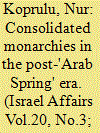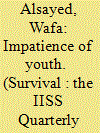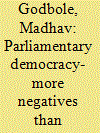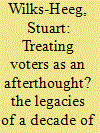| Srl | Item |
| 1 |
ID:
133709


|
|
|
|
|
| Summary/Abstract |
The Arab monarchies remain relatively stable, largely unaffected by the 'Arab Spring' upheavals. In particular, the Hashemite Kingdom of Jordan has emerged relatively unscathed from the region's uprisings. The Jordanian case helps underscore the extent to which the polarization between Palestinian-Jordanians and native Jordanians continues to dominate the nature of public debate and political reform. While initially the 'Arab Spring' generated a spirit of cooperation between these two communities with calls to tackle unemployment culminating in demands for democratization, the persisting schism between them resurfaced when public debates on electoral law commenced. This article analyses the roots and ramifications of the 'Arab Spring' in Jordan, as well as the resilience of the kingdom to the nascent social upheavals.
|
|
|
|
|
|
|
|
|
|
|
|
|
|
|
|
| 2 |
ID:
132470


|
|
|
|
|
| Publication |
2014.
|
| Summary/Abstract |
Youth movements in the Gulf have been effective but ephemeral, sometimes manipulated by established groups or succumbing to social divisions.
In October 2012, thousands of citizens took to the streets of Kuwait City to protest an emergency decree by the emir that amended the country's electoral law in such a way as to undermine the position of the opposition within parliament. The demonstrations were unprecedented both in size and political rhetoric. An estimated 50,000 people addressed the ruler with slogans such as 'we will not let you'. Security forces used tear gas and stun grenades to break up the gatherings. Youth groups formed the backbone of the movement's leadership (at least initially) and supplied much of its rank and file. However, within months, this vibrant and defiant campaign had largely dissipated. Having failed to attain its goals, it was unable to maintain a permanent political presence. Throughout the Gulf region, other youth-led movements have suffered a similar fate. Once groups achieve their original goals or lose their initial momentum due to government resistance, they soon break down, often disappearing altogether from the political scene.
|
|
|
|
|
|
|
|
|
|
|
|
|
|
|
|
| 3 |
ID:
174016


|
|
|
|
|
| Summary/Abstract |
Demands for a second Scottish independence referendum have persisted since 2014. The Scottish government introduced the Referendums (Scotland) Bill at Holyrood in May 2019 to enable referendums within the competence of the Scottish parliament. The Scottish National Party (SNP) government presented this as a framework enabling a range of referendums. Opponents saw this as legislating for a second independence referendum. The act will form a large part of the legal framework and rules for any second independence referendum. Importantly, the legislation provides innovation in electoral law more generally. This article discusses the background to the bill, its initial contents, and debates around and amendments to the bill. It discusses its electoral law innovations, before considering its limitations and place as constitutional debates play out over a second independence referendum.
|
|
|
|
|
|
|
|
|
|
|
|
|
|
|
|
| 4 |
ID:
117123


|
|
|
| 5 |
ID:
086979


|
|
|
|
|
| Publication |
2009.
|
| Summary/Abstract |
Over the past decade, the UK's New Labour government has been at the forefront of efforts internationally to modernise electoral procedures, promising to deliver 'an e-enabled, multi-channel general election by 2006'. This paper considers the origins and the impacts of reforms to UK electoral procedures with a particular focus on the adoption of postal voting on demand and pilots of electronic voting and counting since 2000. The paper concludes that the principal legacy of the modernisation agenda to date is likely to have been a negative impact on public confidence in the electoral process.
|
|
|
|
|
|
|
|
|
|
|
|
|
|
|
|